
Judith Marjorie Collins is an American singer-songwriter and musician with a career spanning seven decades. An Academy Award-nominated documentary director and a Grammy Award-winning recording artist, she is known for her eclectic tastes in the material she records, for her social activism, and for the clarity of her voice. Her discography consists of 36 studio albums, nine live albums, numerous compilation albums, four holiday albums, and 21 singles.
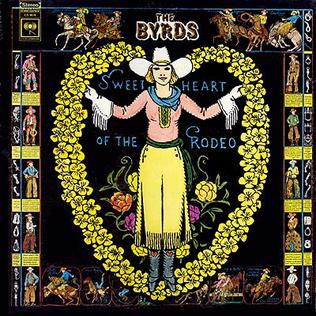
Sweetheart of the Rodeo is the sixth studio album by the American rock band the Byrds, released in August 1968 by Columbia Records. Recorded with the addition of country rock pioneer Gram Parsons, it became the first album widely recognized as country rock as well as a seminal progressive country album, and represented a stylistic move away from the psychedelic rock of the band's previous LP, The Notorious Byrd Brothers. The Byrds had occasionally experimented with country music on their four previous albums, but Sweetheart of the Rodeo represented their fullest immersion into the genre up to that point in time. The album was responsible for bringing Parsons, who had joined the Byrds in February 1968 prior to the start of recording, to the attention of a mainstream rock audience for the first time. Thus, the album is an important chapter in Parsons' crusade to make country music fashionable for a young audience.
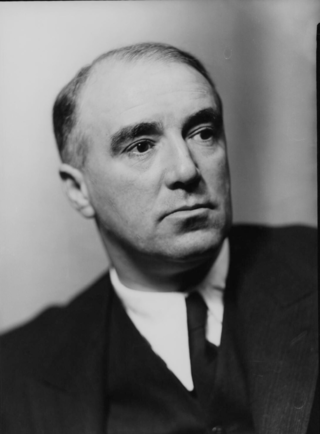
Harry Pollitt was a British communist who served as the General Secretary of the Communist Party of Great Britain (CPGB) from July 1929 to September 1939 and again from 1941 until his death in 1960. Pollitt spent most of his life advocating communism. Ideologically a Marxist–Leninist, Pollitt was an adherent particularly of Joseph Stalin even after Stalin's death and disavowal by Nikita Khrushchev. Pollitt's acts included opposition to the Allied intervention in the Russian Civil War and Polish–Soviet War, support for the Spanish Republicans during the Spanish Civil War, both support for and opposition to the war against Nazi Germany, defence of the communist coup in Czechoslovakia, and support for the 1956 Soviet invasion of Hungary.

The Kingston Trio is an American folk and pop music group that helped launch the folk revival of the late 1950s to the late 1960s. The group started as a San Francisco Bay Area nightclub act with an original lineup of Dave Guard, Bob Shane, and Nick Reynolds. It rose to international popularity fueled by unprecedented sales of LP records and helped alter the direction of popular music in the U.S.

"Blowin' in the Wind" is a song written by Bob Dylan in 1962. It was released as a single and included on his album The Freewheelin' Bob Dylan in 1963. It has been described as a protest song and poses a series of rhetorical questions about peace, war, and freedom. The refrain "The answer, my friend, is blowin' in the wind" has been described as "impenetrably ambiguous: either the answer is so obvious it is right in your face, or the answer is as intangible as the wind".

Taalib Johnson, better known by his stage name Musiq Soulchild is an American singer-songwriter. His music blends R&B, funk, blues, jazz, and gospel influences fused with hip hop.

Alex Hassilev was an American folk musician who was one of the founding members of the group The Limeliters. Educated at Harvard and the University of Chicago, he was also an actor with a number of film and television appearances to his credit. As a musician he played the guitar and the banjo and was fluent in several languages. After retiring from the Limeliters, Hassilev remained active in the field of record production.
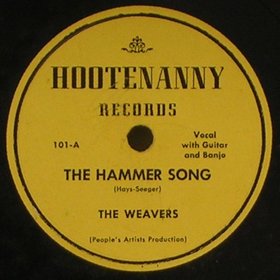
"If I Had a Hammer " is a protest song written by Pete Seeger and Lee Hays. It was written in 1949 in support of the Progressive movement, and was first recorded by the Weavers, a folk music quartet composed of Seeger, Hays, Ronnie Gilbert, and Fred Hellerman. It was a No. 10 hit for Peter, Paul and Mary in 1962 and then went to No. 3 a year later when recorded by Trini Lopez in 1963. In a May 1963 interview on Folk Music Worldwide, Paul Stookey of Peter, Paul and Mary characterized the song as "a young national anthem for the United States".

Glenn Robertson Yarbrough was an American folk singer and guitarist. He was the lead singer (tenor) with the Limeliters from 1959 to 1963 and also had a prolific solo career. Yarbrough had a restlessness and dissatisfaction with the music industry which led him to question his priorities, later focusing on sailing and the setting up of a school for orphans.

The Limeliters are an American folk music group, formed in July 1959 by Lou Gottlieb, Alex Hassilev (banjo/baritone), and Glenn Yarbrough (guitar/tenor). The group was active from 1959 until 1965, and then after a hiatus of sixteen years, Yarbrough, Hassilev, and Gottlieb reunited and began performing again as The Limeliters in reunion tours. On a regular basis, a continuation of The Limeliters group is still active and performing. Gottlieb died in 1996, Yarbrough died in 2016, and Hassilev died in 2024. Hassilev, the last founding member, who had remained active in the group, retired in 2006, leaving the group to carry on without any of the original members.

"The First Time Ever I Saw Your Face" is a 1957 folk song written by British political singer-songwriter Ewan MacColl for Peggy Seeger, who later became his third wife. At the time, the couple were lovers, although MacColl was still married to his second wife, Jean Newlove. Seeger sang the song when the duo performed in folk clubs around Britain. During the 1960s, it was recorded by various folk singers and became a major international hit for Roberta Flack in 1972, winning Grammy Awards for Record of the Year and Song of the Year. Billboard ranked it as the number-one Hot 100 single of the year for 1972.
"Turn! Turn! Turn!", also known as or subtitled "To Everything There Is a Season", is a song written by Pete Seeger in 1959. The lyrics – except for the title, which is repeated throughout the song, and the final two lines – consist of the first eight verses of the third chapter of the biblical Book of Ecclesiastes. The song was originally released in 1962 as "To Everything There Is a Season" on the folk group the Limeliters' album Folk Matinee, and then some months later on Seeger's own The Bitter and the Sweet.
Louis Gottlieb credited as Lou Gottlieb, was an American bassist and comic spokesman for music trio The Limeliters. He held a PhD in musicology and was considered one of the so-called "new comedy" performers, a new generation of unabashed intellectuals that also included Mort Sahl, Nichols and May, and Lenny Bruce. In 1966 he established the Morningstar Ranch, a community that he declared open to all people and which later became central to a legal dispute related to the ethics of ownership of land.
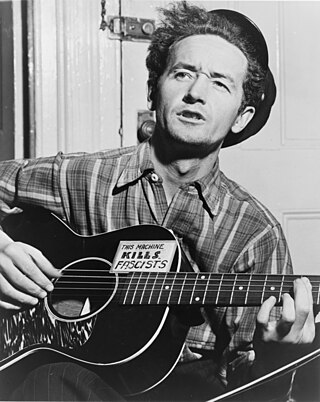
The American folk music revival began during the 1940s and peaked in popularity in the mid-1960s. Its roots went earlier, and performers like Josh White, Burl Ives, Woody Guthrie, Lead Belly, Big Bill Broonzy, Richard Dyer-Bennet, Oscar Brand, Jean Ritchie, John Jacob Niles, Susan Reed, Paul Robeson, Bessie Smith, Ma Rainey and Cisco Houston had enjoyed a limited general popularity in the 1930s and 1940s. The revival brought forward styles of American folk music that had in earlier times contributed to the development of country and western, blues, jazz, and rock and roll music.
"You Ain't Goin' Nowhere" is a song written by the American musician Bob Dylan in 1967 in Woodstock, New York, during the self-imposed exile from public appearances that followed his July 29, 1966 motorcycle accident. A recording of Dylan performing the song in September 1971 was released on the Bob Dylan's Greatest Hits Vol. II album in November of that year, marking the first official release of the song by its author. Earlier 1967 recordings of the song, performed by Dylan and the Band, were issued on the 1975 album The Basement Tapes and the 2014 album The Bootleg Series Vol. 11: The Basement Tapes Complete.
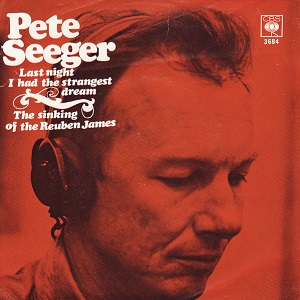
"Last Night I Had the Strangest Dream" is a song written by American folk singer-songwriter Ed McCurdy in 1950. Due to McCurdy's connection with fellow musicians, it was common in repertoires within the folk music community. The song had its first album release when Pete Seeger recorded it as "Strangest Dream" for his 1956 album Love Songs For Friends & Foes. Seeger would later re-visit the song for his 1967 album Waist Deep in the Big Muddy and other Love Songs. The strong anti-war theme of the song led it to be recorded by multiple other artists, including The Weavers (1960), Joan Baez (1962), The Kingston Trio (1963), Simon & Garfunkel (1964), and Johnny Cash who released two versions of the song during the 2000s.
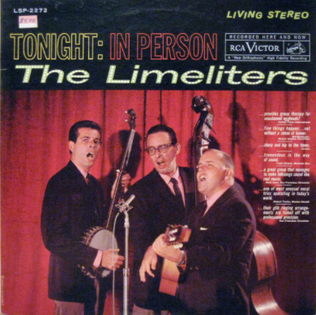
Tonight: In Person is a live album by the American folk music group, The Limeliters, a trio made up of Lou Gottlieb, Alex Hassilev, and Glenn Yarbrough. It was recorded live on July 29, 1960, in Hollywood, California, at the Ash Grove, a former Melrose Avenue furniture factory converted into a folk music club. The album was released in January 1961 on the RCA Victor label. It was the group's first album for RCA Victor.

The Limeliters is a studio album by the American folk music group, The Limeliters, a trio made up of Lou Gottlieb, Alex Hassilev, and Glenn Yarbrough. It was released in 1960 on the Elektra label. It was the group's first album and its only album for Elektra.

Through Children's Eyes is a live album by the American folk music group, The Limeliters, backed by a chorus of 70 children from the Berkeley Unified School District in California. The album was recorded on 29 December 1961 at the Berkeley Community Theater, Berkeley, California as a "benefit for the Music Department of the Berkeley school system, as well as an opportunity to record The Limeliters in unusual and delightful circumstances." It was released in 1962 on the RCA Victor label. Each of the original members of the group cited the album as their most satisfying. On the liner notes of the album, Gottlieb said: "I cannot tell you what a kick it was to sing with those children...The sound of their voices was - and I know this seems corny but it is true - simply an inspiration to us."

Folk Matinee is a studio album by the American folk music group, The Limeliters, a trio made up of Lou Gottlieb, Alex Hassilev, and Glenn Yarbrough. It was released in 1962 on the RCA Victor label.

















